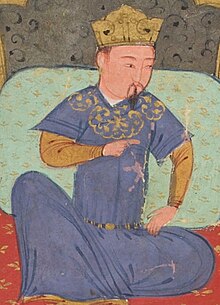Batu Khan

Batu Khan, Batu, Sain-Khan (1208–1255), was a Mongol Khan (Emperor), son of Jochi and grandson of Genghis Khan.
After his father's death (1227), he took command of Jochi's ulus (horde). In 1236, he conquered the Dasht-i Qipchaq (the Steppes of the Kipchaks). From 1237 to 1243, he led a military campaign in Eastern Europe, during which he became notorious for his extreme cruelty. However, the resistance of the Russian people and the defiance of cities like Ryazan, Moscow, Vladimir, Kozelsk, Kyiv, and others significantly weakened his army.
In 1240, he campaigned in Eastern Europe—Poland, Bohemia, Hungary, and Dalmatia. After the death of the great Mongol Khan Ögedei (December 1241), Batu returned to Jochi's ulus in the spring of 1242 to strengthen his position. In 1243, on the lower reach of the Volga River, he established the feudal state of the Golden Horde (the capital city was Sarai-Batu). In 1251, with his support, Möngke was elected as the Great Khan of the Empire during the kurultai.
Batu had relations with Georgia, which at that time was subject to the Great Khan of the Mongols. According to the "Life of Kartli," part of the Georgian nobility and Mongol commanders sent David VII (son of Giorgi-Lasha) to Batu to appoint him as King of Georgia. According to the chronicle, Batu "welcomed King David with kindness" and sent him to the court of Möngke Khan at Karakorum.
Literature: ჯ ა ვ ა ხ ი შ ვ ი ლ ი ი ვ., ქართველი ერის ისტორია, (წგ. 3), თბ., 1982 (თხზ. თორმეტ ტომად, ტ. 3); Г р е к о в В. Д., Я к у б о в с к и й А. Ю., Золотая Орда и ее падение, М.-Л., 1950.


